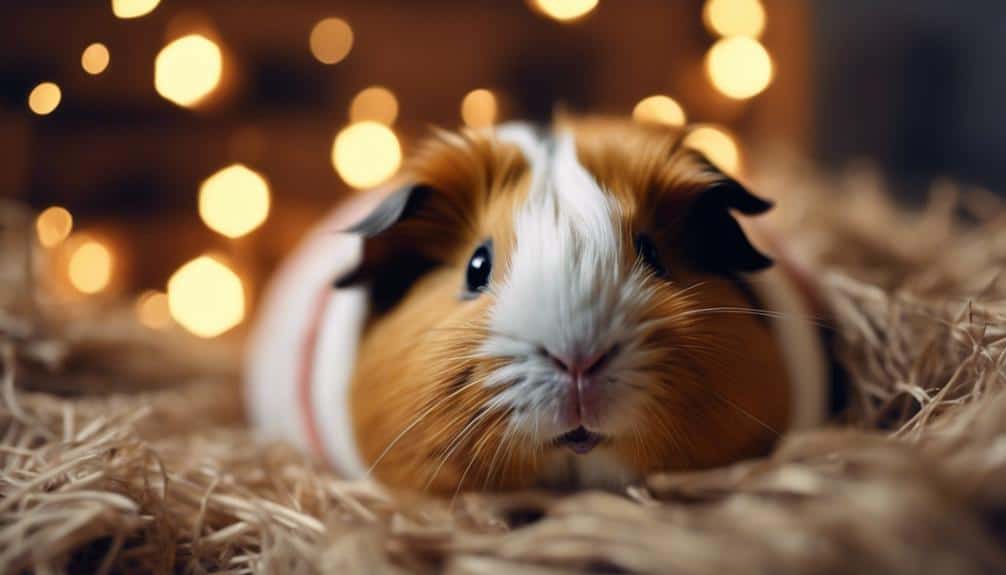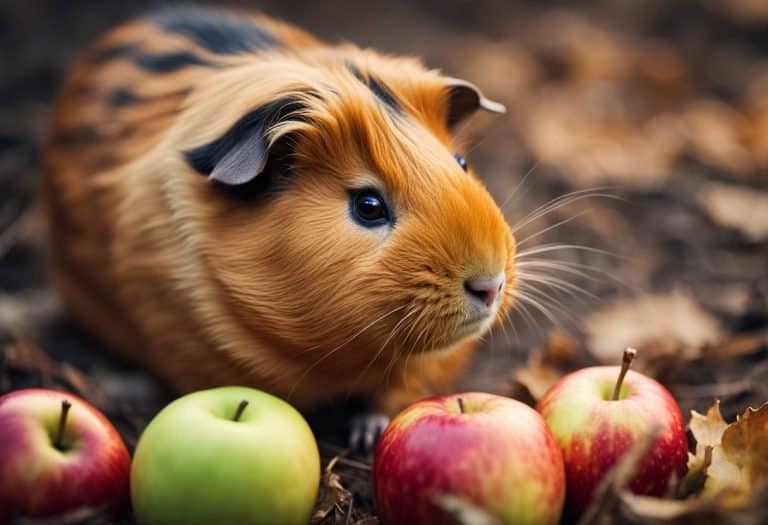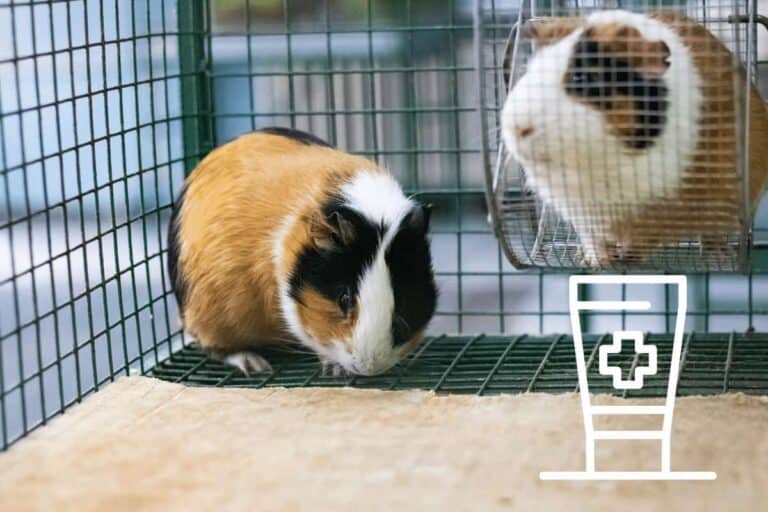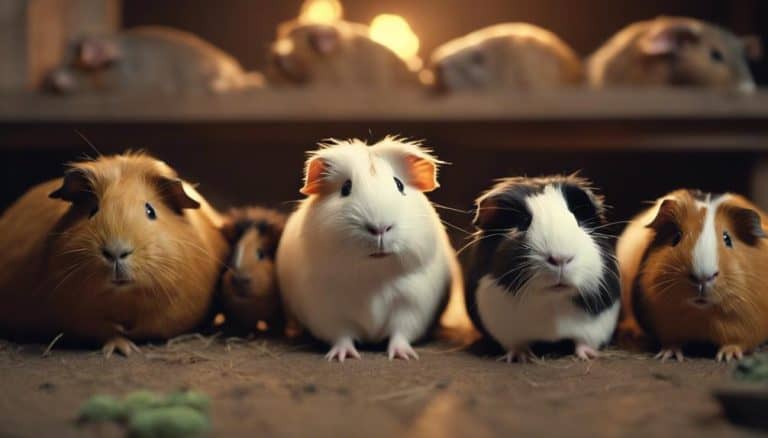How Long Do Guinea Pigs Sleep: A Comprehensive Guide
Did you know that guinea pigs need 4-6 hours of sleep per day? Understanding how these adorable pets rest can provide valuable insights into their overall well-being.
As we explore the intricate world of guinea pig sleep habits, we uncover fascinating details about their preferred environments, behaviors, and the significance of monitoring their sleep health.
Stay tuned to discover practical tips and essential information that can help you guarantee your guinea pig’s happiness and health.
Guinea Pig Sleep Patterns Explained
Exploring the intricacies of guinea pig sleep patterns reveals a fascinating blend of unique behaviors and adaptations. Guinea pigs, known for their endearing nature, engage in peculiar sleeping habits. These creatures sleep approximately 4 to 6 hours each day, opting for short power naps rather than long stretches of rest. One intriguing aspect is that most guinea pigs sleep with their eyes wide open, a behavior that sets them apart from many other animals. Being crepuscular animals, they stay active during both day and night, showcasing sporadic napping tendencies.
Unlike humans, guinea pigs don’t have a consolidated sleep schedule but instead break up their sleep into smaller segments. Throughout the day, they display increased activity levels during dawn and dusk, which influences their sleep patterns. This behavior of being active during these changing periods adds to the uniqueness of guinea pig sleep habits. Understanding these nuances sheds light on the fascinating world of guinea pig behavior.
Factors Influencing Guinea Pig Sleep
Factors that influence the sleep patterns of guinea pigs include their natural habitat and the need to remain alert for potential predators. Guinea pigs love to nap throughout the day and night, rather than having one long sleep period. To help guinea pigs to sleep better, it’s important to pay attention to their environment. Here are some key factors:
- Dark and Sheltered Environment: Providing a dark and sheltered sleeping environment can promote longer naps for guinea pigs. This mimics their natural habitat and helps them feel safe and secure.
- Moderate Temperatures: Guinea pigs are most active when temperatures are moderate. Extreme temperatures can disrupt their sleep patterns.
- Predator Presence: Guinea pigs are naturally cautious animals, so they’re more likely to sleep when they feel safe and when predators are less likely to be around.
- Noise Levels: Keeping the noise level down is essential for guinea pigs to have uninterrupted sleep. They’re sensitive to loud sounds and may keep their eyes wide open in response to odd sleeping noises.
Health Implications of Guinea Pig Sleep
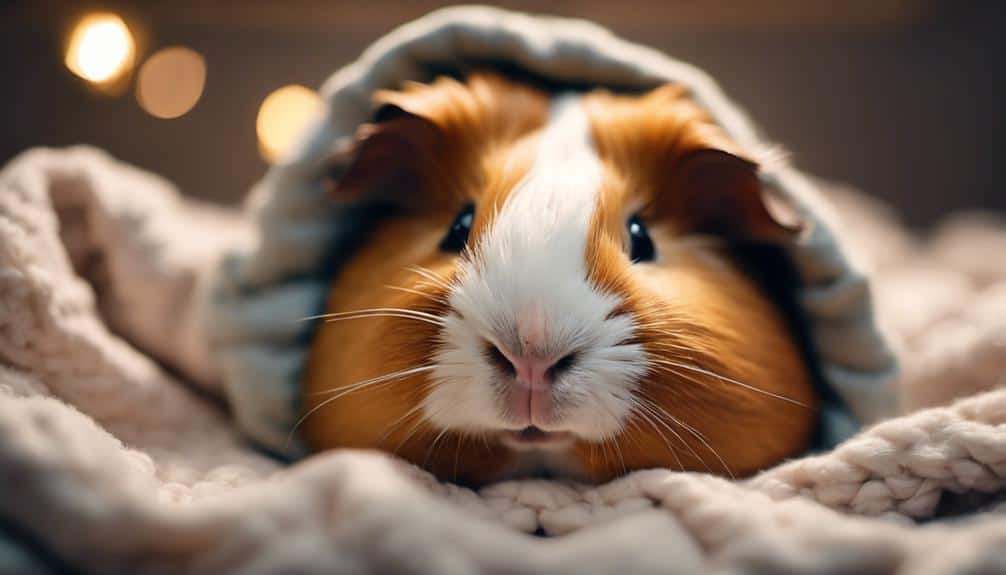
Guinea pigs’ sleep patterns directly impact their overall health, with inadequate rest potentially compromising their immune system and leading to behavioral changes and weight loss. As prey animals, guinea pigs need to feel secure in their sleep routine to guarantee their wellness. Pet owners play a vital role in monitoring their guinea pigs’ sleep habits to detect any potential health issues early on. Here is a table highlighting the importance of guinea pig sleep for their health:
| Health Issue | Impact on Guinea Pigs |
|---|---|
| Weakened Immune System | Lack of sleep can compromise their immune system, making them more susceptible to illnesses. |
| Behavioral Changes | Sleep-deprived guinea pigs may exhibit changes in behavior, such as increased irritability or aggression. |
| Weight Loss | Inadequate rest can lead to weight loss and decreased activity levels. |
| Overall Health | Chronic sleep deprivation can have negative effects on a guinea pig’s overall health. |
Creating a Sleep-Friendly Environment
Ensuring a safe and comfortable sleep environment is important for promoting the best rest for guinea pigs. When setting up a sleep-friendly space for your guinea pig, consider the following:
- Trust: Guinea pigs need to feel safe and trust their surroundings to fully close their eyes while sleeping. Building a bond of trust with your pet can help them relax and rest peacefully.
- Health and Activity Levels: A good sleep environment contributes to the overall health and activity levels of guinea pigs. Proper rest is essential for their well-being and energy levels during waking hours.
- Stress and Illness: Factors like stress, illness, and pain can disrupt a guinea pig’s sleep patterns. Creating a calm and quiet sleeping area can help minimize these disruptions.
- Bedding and Ventilation: Comfortable bedding, proper ventilation, and a quiet sleeping area are essential for ensuring guinea pigs get quality rest. Soft bedding materials and good airflow can contribute to a cozy and restful environment for your pet.
Monitoring Your Guinea Pig’s Sleep Behavior
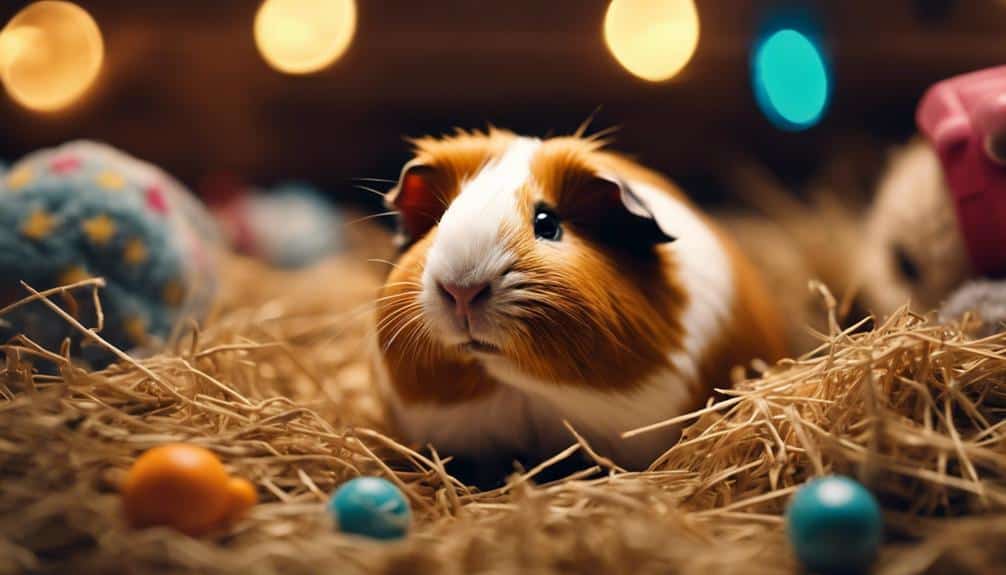
To guarantee the well-being of your guinea pig, closely observe their sleep behavior by monitoring their napping patterns throughout the day. Guinea pigs, like humans, have individual sleep patterns, so it’s important to track any changes in their routine. Increased or decreased nap times could be indicators of underlying health issues. Keep an eye out for signs of restlessness or excessive sleepiness, as these could also signal potential problems affecting your guinea pig’s well-being. Remember, inadequate sleep can weaken their immune system and lead to behavioral changes.
Regularly evaluating your guinea pig’s sleep environment is vital. Make sure that their sleeping area is quiet, comfortable, and free from disturbances. By maintaining a peaceful sleep environment, you can promote better rest for your guinea pig, contributing to their overall health and happiness. Monitoring your guinea pig’s sleep behavior is a proactive way to detect any issues early on and provide them with the care they need.
Conclusion
To sum up, understanding guinea pigs’ sleep habits is vital for their overall well-being. By providing a sleep-friendly environment and monitoring their behavior, we can guarantee they get the rest they need to stay healthy and happy.
Remember, ‘A well-rested guinea pig is a happy guinea pig.’ Keep an eye on their sleep patterns and make adjustments as needed to promote a good night’s sleep for your furry friend.

